 The Philokalia
The PhilokaliaThe Philokalia
A Classic Text of
Orthodox Spirituality
EDITED BY
Brock Bingaman and Bradley Nassif


Oxford University Press is a department of the University of Oxford.
It furthers the Universitys objective of excellence in research,
scholarship, and education by publishing worldwide.
Oxford New York
Auckland Cape Town Dar es Salaam Hong Kong Karachi
Kuala Lumpur Madrid Melbourne Mexico City Nairobi
New Delhi Shanghai Taipei Toronto
With offices in
Argentina Austria Brazil Chile Czech Republic France Greece
Guatemala Hungary Italy Japan Poland Portugal Singapore
South Korea Switzerland Thailand Turkey Ukraine Vietnam
Oxford is a registered trade mark of Oxford University Press in the UK and certain other countries.
Published in the United States of America by Oxford University Press
198 Madison Avenue, New York, NY 10016
Oxford University Press 2012
All rights reserved. No part of this publication may be reproduced,
stored in a retrieval system, or transmitted, in any form or by any means, without
the prior permission in writing of Oxford University Press, or as expressly
permitted by law, by license, or under terms agreed with the appropriate
reproduction rights organization. Inquiries concerning reproduction outside the
scope of the above should be sent to the Rights Department, Oxford University Press,
at the address above.
You must not circulate this work in any other form and you must impose this same
condition on any acquirer.
Library of Congress Cataloging-in-Publication Data
The Philokalia : a classic text of orthodox spirituality / edited by Brock Bingaman and Bradley Nassif.
p. cm.
Includes index.
ISBN 978-0-19-539026-1ISBN 978-0-19-539027-8
1. Philokalia. 2. Spiritual lifeEastern Orthodox Church.
I. Bingaman, Brock. II. Nassif, Bradley.
BX382.P43P55 2012
248.4819dc23 2011024978
9 8 7 6 5 4 3 2 1
Printed in the United States of America
on acid-free paper
For
Amanda






Brock
and
Barbara
whose virtues and noble character are more
precious than rubies (Pr. 31:1031)
Brad
 CONTENTS
CONTENTS FOREWORD
FOREWORDThe Church, wrote the Russian Orthodox theologian Archpriest Georges Florovsky, gives us not a system but a key; not a plan of Gods City, but the means of entering it. Perhaps someone will lose his way because he has no plan. But all that he will see, he will see directly, it will be real for him; while he who has studied only the plan, risks remaining outside and not really finding anything.
What Fr. Florovsky said of the Church is true equally of the Philokalia. It is precisely a book that gives us not a system but a key; not an abstract outline of the spiritual way, but the means of ourselves undertaking the journey. It is in that sense an eminently practical book, a book that invites us to see directly, to explore and discover for ourselves. It provides not information but wisdom. It is not systematic, and it does not attempt to offer a single, all-embracing theory of the life of prayer. Yet, if read attentively and with an open mind, the texts that it containswritten by some thirty-six writers, extending chronologically over more than a millenniumhave the power to alter our inner world, to effect a radical change in our will, and to reveal to us possibilities that previously we never imagined possible. The authors in the Philokalia write, not in an academic or scholastic spirit, but on the basis of their personal experience; and they ask of us that in our turn we will read their words in a personal and experiential manner. In the phrase that Cardinal Newman chose as his motto, Cor ad cor loquitur, Heart speaks to heart.
The Philokalia is not an easy book. We have to make the effort to climb the slopes of the mountain if we are to enjoy the view from the summit. Yet those who persist will find that the basic message of the Philokalia is exceedingly simple. It is summed up in the words of one of the authors close to the end of the work, Kallistos Kataphygiotis: The greatest thing that happens between God and the human soul is to love and to be loved. This basic message of mutual love is worked out in terms of the doctrines of the Trinity and the Incarnation, and in terms also of a unified, holistic view of human nature that assigns a positive role to our body. It is this mutual love that gives meaning to the recitation of the Jesus Prayer, about which the Philokalia has much to say; and it is this mutual love that leads ultimately, in the experience of the saints, to the vision of divine and uncreated Light. In the philokalic vision of the truth, love is both our starting-point and our end-point.
The authors in the Philokalia were writing in a world very different from our own, and yet what they have to say is startlingly relevant. Although this is not its immediate aim, the Philokalia has clear and challenging implications for the way in which we confront the major public crises in contemporary society, whether in politics, in international relations, or in the realm of ecology. For it speaks to us not only about inner prayer but also about the transfiguration of the world. It speaks about a God who is totally transcendent yet totally immanent, who is mystery beyond all understanding but who is also directly present in everything that he has made.
Indeed, when the first volume of extracts chosen from the Philokalia was published in 1951, The Catholic Herald commented, This selection is one of the most important spiritual treatises ever to be translated into English. These are bold affirmations; but readers of the present volume, edited by Dr. Brock Bingaman and Dr. Bradley Nassif, will perhaps begin to understand why such claims have been made. The aim of the editors and contributors will be amply fulfilled if this collective work enables our readers to study the actual text of the Philokalia with deeper understanding and with an ever-increasing imaginative sympathy.
Kallistos Ware
Metropolitan of Diokleia
 PREFACE
PREFACEThe present volume is the fruit of fine scholars from around the world, from Orthodox, Catholic, and Protestant traditions. It has been a joy working with these women and men on a project that will initiate further studies into this great collection of Orthodox spirituality known as the


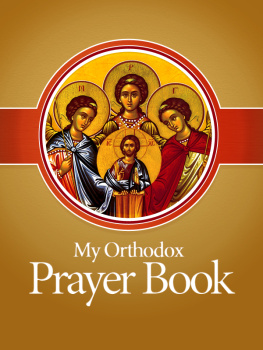
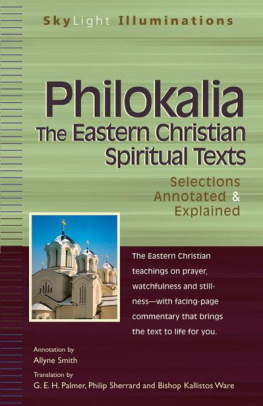
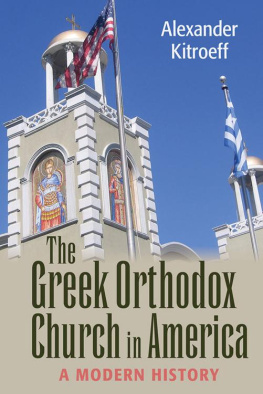
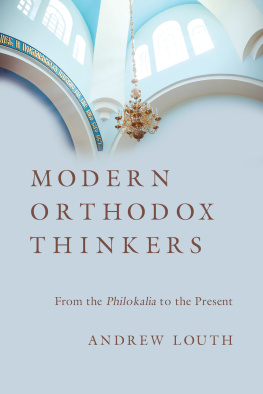
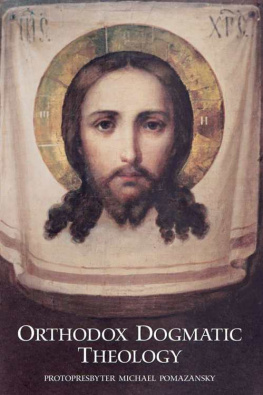
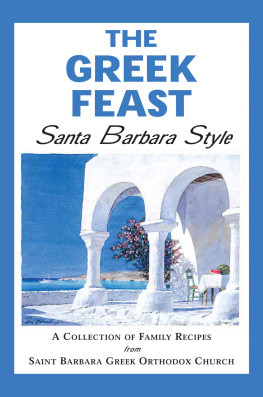

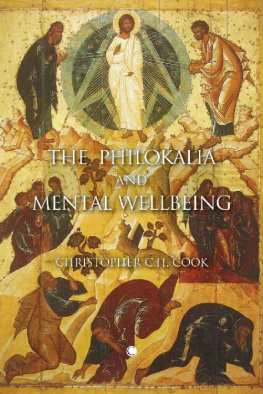
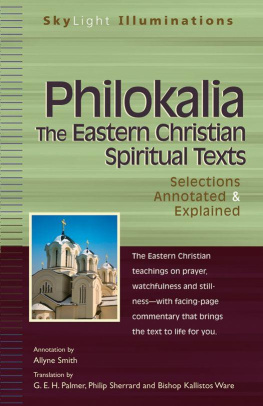
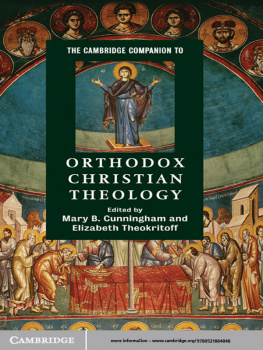

 The Philokalia
The Philokalia




